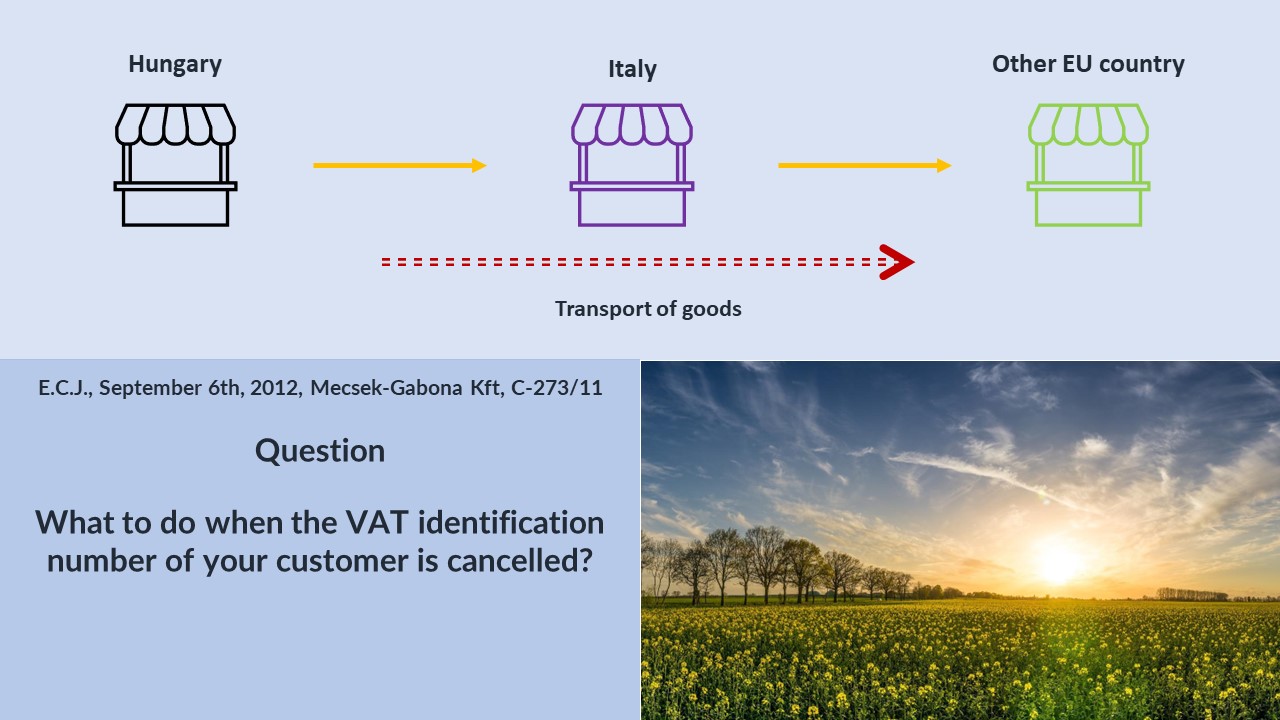VAT exemption for intracommunity delivery of goods
Member States shall exempt from VAT the supply of goods dispatched or transported to a destination outside their respective territory but within the Community, by or on behalf of the vendor or the person acquiring the goods, for another taxable person, or for a non-taxable legal entity acting as such in Member State other than that in which dispatch or transport of the goods began (article 138 (1) from the VAT Directive).
Each Member State may determine, while respecting the general principles of European Union law, the conditions in which it exempts from VAT intra-Community supplies of goods in order to guarantee the correct and simple treatment of that exemption and prevent any possible fraud, tax avoidance or abuse from being committed.
The case
A Hungarian company sold several tonnes of rapeseed to an Italian company which was in charge of transporting the goods from Hungary to another Member State. The Hungarian vendor exempted its sale from VAT as an intra-Community delivery and issued an invoice to the Italian purchaser without invoicing Hungarian VAT.
The Hungarian supplier exercised its right to VAT exemption relying on the VAT identification number allocated to the buyer by the Italian authorities, on the fact that the goods sold had been carried out by trucks registered in another Member State and on the CMR consignment notes the purchaser sent back from its postal address, specifying that the goods had been dispatched to Italy.
The case in a nutshell

VAT Litigation
However, the Hungarian tax authorities refused the VAT exemption. On the basis of the data they collected from Italian Inland Revenue, they learned the buyer was unknown to the Italian tax authorities and, besides, its VAT identification number was removed from the register with retroactive effect [on a date prior to the supply].
What does the Court of Justice say?
The Hungarian supplier challenges this position and the case was eventually debated before the Court of Justice which confirmed the following:
- Since the abolition of border controls between Member States, even if an intra-Community supply of goods is per se defined as a physical transfer of those goods outside the Member State of supply, controlling if the goods have physically left the territory of said Member State or not has become challenging for the tax authorities. Consequently, the tax authorities verify the correctness of information essentially on the basis of the evidence submitted by taxable persons and their returns. In this specific framework, they cannot demand the supplier to produce conclusive proof that the goods have physically left its territory.
The Court took the view that, in a situation in which no satisfactory evidence enables to conclude that the goods have actually left the territory, forcing a vendor to provide such a proof does not guarantee that the exemption will be correctly and easily applied. On the contrary, this obligation leaves this taxable person in doubt about the possibility of applying the exemption or the need to include the VAT in the sales price.
- A vendor may not be denied VAT exemption if he has fulfilled its obligations as regards to evidence in accordance with national law and it appears later that the buyer did not meet its contractual obligation to dispatch the goods outside the Member State of supply. In such circumstances, it is the latter which must be held liable for VAT in this Member State.
VAT exemption may be denied to the vendor only if he knew or should have known that the transaction was part of a tax fraud committed by the buyer or had not taken every reasonable measure to prevent that fraud from being committed.
-
It would be contrary to the principle of proportionality for the vendor to be held liable for VAT solely on the ground that the buyer’s VAT identification number had been annulled with retroactive effect. Given that competent national authorities are obliged to verify if the taxable person is actually liable for VAT before allocating a VAT identification number, a possible irregularity affecting this register cannot result in refusing a taxable person, who relied on the data available in that register, the right to a VAT exemption it could legally benefit of.
Source: E.C.J., September 6th, 2012, Mecsek-Gabona Kft, C-273/11
The Expert's eye
The vendor must submit evidence that the goods have been dispatched or transported outside the country of departure but within the European Union. It must hold all the documents proving the goods have actually been dispatched or transported. These documents include amongst other things the contracts, purchase orders, transport and payment documents. In its judgment delivered today, the Court of Justice points out that the tax authorities must verify if the goods have left the territory on the basis of the documents provided by the vendor but cannot demand that the latter produces tangible proof that the goods have physically left the territory. The VAT exemption must be granted where the vendor acting in good faith holds reliable documents (CMR, consignment notes, etc.) showing the goods have left the territory even though it will turn out later that the purchaser did not fulfil its contractual obligation to dispatch the goods outside the country.
Contact us
Any VAT question ?
We offer you the opportunity to discuss the subject during a free videoconference.
